Published 4th May 2020
Warpcast: A Decentralised Twitter | 4 Future Uses For Farcaster Frames

Decentralisation and user control over their own data is leading to a more equitable and empowered experience on the internet. Web3 social networks like Bluesky, Mastodon and Friend.tech offer exciting alternatives to Twitter and Facebook, but today we’re talking about what we think is the most exciting alternative of all: Farcaster.
Forget the like-chasing echo chambers and algorithm-fuelled feeds of traditional social media. Farcaster is ushering in a new era of online interaction: one built on decentralisation, user control, and innovation. Dive into the heart of this web3 social protocol and discover how it’s radically transforming the way we connect, create, and express ourselves online.
What is Farcaster?
Farcaster is a decentralised hub for censorship-free social apps. Own your data, connect across platforms, and freely express yourself – all with one identity. Think X, Instagram, and Facebook united, user-controlled, and uncensored. Choose your app, not your limitations.
Farcaster builds on the Optimism network, a fast and affordable layer atop Ethereum. This makes it open-source and highly customisable, encouraging diverse apps and fostering transparency. Think of it like email: multiple platforms (Gmail, Yahoo) use the same email protocol, letting you connect freely.
This decentralised approach sets Farcaster apart. Anyone can deploy nodes (computers running the software) and participate in the network, making it censorship-resistant and user-controlled. But usernames? The network requires that user IDs are just strings of letters and digits, which are hard to remember! Enter Ethereum Name Service (ENS), which translates these long addresses into user-friendly names.
Remember, Farcaster is a protocol, not a platform. Like email, it’s the underlying language apps use to connect, not a single website or app itself. This opens up exciting possibilities for multiple platforms to utilise the Farcaster protocol, the most popular of which currently is Warpcast.
What is Warpcast?
Warpcast is a mobile client application that allows you to access and interact with Farcaster. It’s available on both iOS and Android and acts as the gateway to exploring and participating in the Farcaster community.
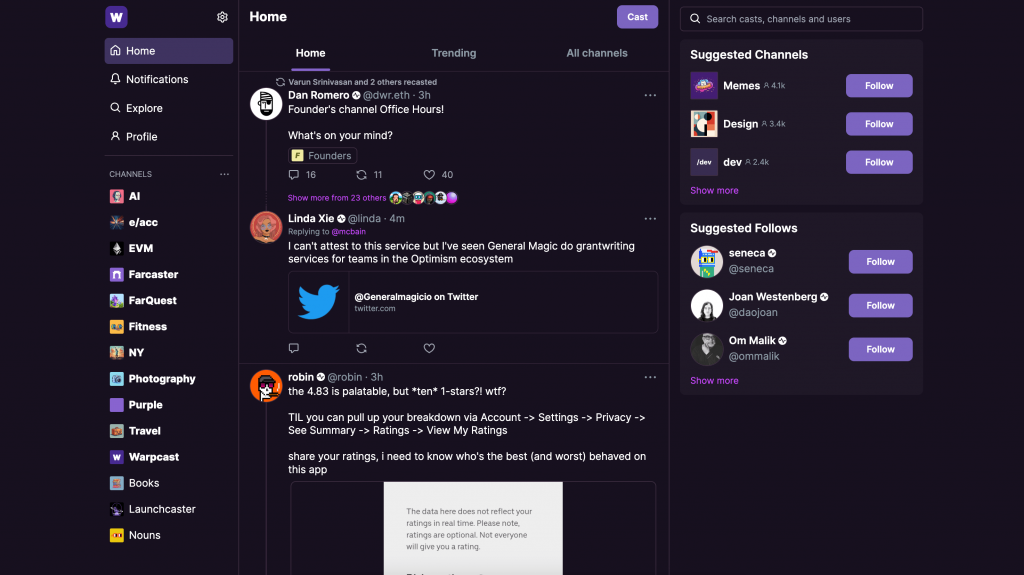
It is often referred to as the ‘Crypto Twitter’ for its resemblance to the popular social media platform, now known as X. Warpcast offers a familiar interface to users, allowing people to post ‘casts’ on the platform, which function identically to tweets.
The big difference between Warpcast and Twitter is the focus on user control of their data, and community-driven governance. As a user, this means the benefits of using Warpcast are that there is no single entity that dictates the rules, users have actual ownership of their own data and can decide the direction of the platform.
Warpcast has seen a lot of attention recently thanks to a surge in daily active users, shooting from approximately 5,000 on Jan. 28 to over 24,700 by Feb. 3, after their newest innovation: the ‘Frames’ feature.
What are Frames on Farcaster?
Web2 social media networks have been at odds with their own users for years. Social posts that contain links to external sites are actively penalised by social media platforms, bringing down average engagement from 352 people to just 139 people. Most people that use social media professionally rely on it to promote their work, which more often than not will only be accessible through an external link.
Farcaster is seeking to change this adversary situation between the people and the platform through its newest feature, currently being deployed with great success on Warpcast: Frames.
Frames aren’t just fancy links on Farcaster. They’re gateways to a world of possibilities, seamlessly integrated within the Warpcast app. Forget clunky redirects and frustrating logins; with Frames, interacting with external applications feels natural and intuitive.
Imagine browsing an NFT gallery, casting your vote in a poll, or even purchasing merchandise – all directly within a post, using your existing Farcaster credentials and assets. And unlike traditional platforms where data is locked away, Frames operate on the decentralised Ethereum network, giving you control over your information.
This opens doors to exciting possibilities: imagine participating in decentralised governance, making micro-transactions within posts, or even enjoying interactive learning experiences. Frames are still young, but they’re a glimpse into a future where social media transforms into a dynamic, interconnected landscape, empowering users, enabling creators, and bursting with limitless potential.
4 Examples of Farcaster Frames
Currently, Frames have been used to allow users to complete actions such as:
Instant checkout
While the Girl Scout cookie Frame showcased an early non-web3 application, Frames are now evolving to revolutionise online shopping. Imagine seamlessly buying merchandise directly from a post, skipping external websites and supporting creators instantly. This future is already here with Frames, making impulse purchases easier and empowering creators with direct transactions.
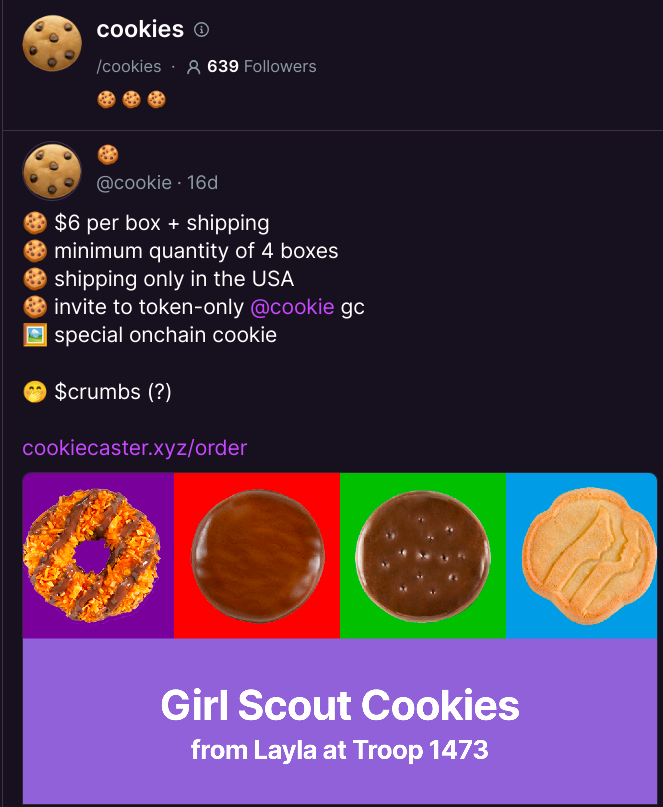
DAO proposal voting
Groups forming DAOs based on shared interests or projects could integrate governance into the social experience using Frames. DAO members can submit proposals for funding allocation, project direction, or internal rules, encapsulated within Frames.
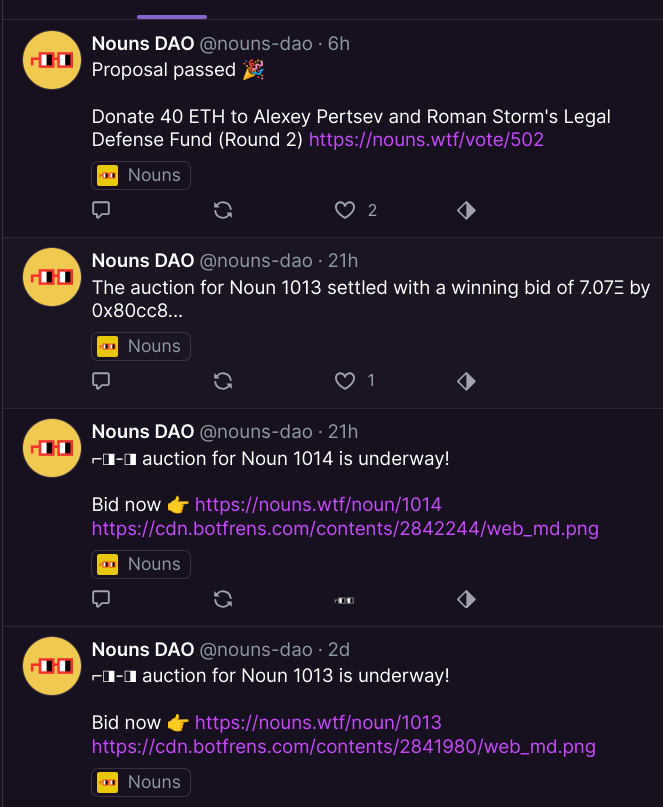
Subscriptions
Writers, artists or podcasters could set up tiered subscriptions within their Frames, offering exclusive content, early access, or community perks to paying subscribers. Subscriptions wouldn’t rely on traditional payment platforms. Instead, users can securely pay with their Ethereum wallets, making it much easier for users to interact with their favourite content creators directly through the social platform. A great example of this is the ability to subscribe users to newsletters without them ever having to leave the feed.
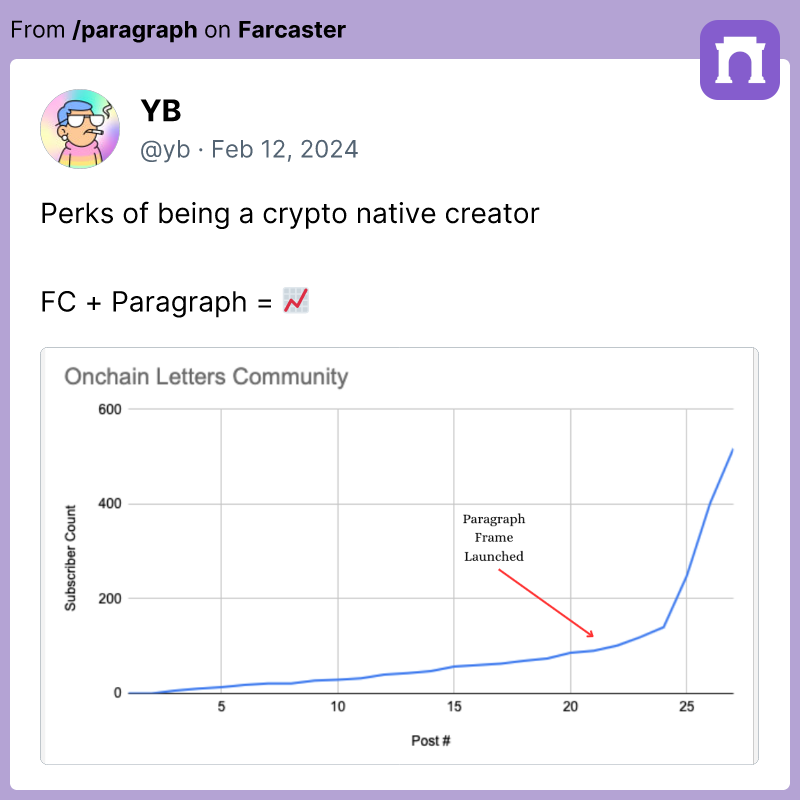
Games
Farcaster’s Frames aren’t just about transactions and subscriptions; they hold immense potential for revolutionising how we interact with games within the platform. Imagine seamlessly diving into a game experience directly from a newsfeed post or engaging in social challenges embedded within your favourite Farcaster community. Developers can embed mini-games, challenges and puzzles directly into posts, with the possibility of adding play-to-earn functionality. Within a week of Frames being implemented, users had already built a range of games from simple guess the number competitions to fully functional chess!
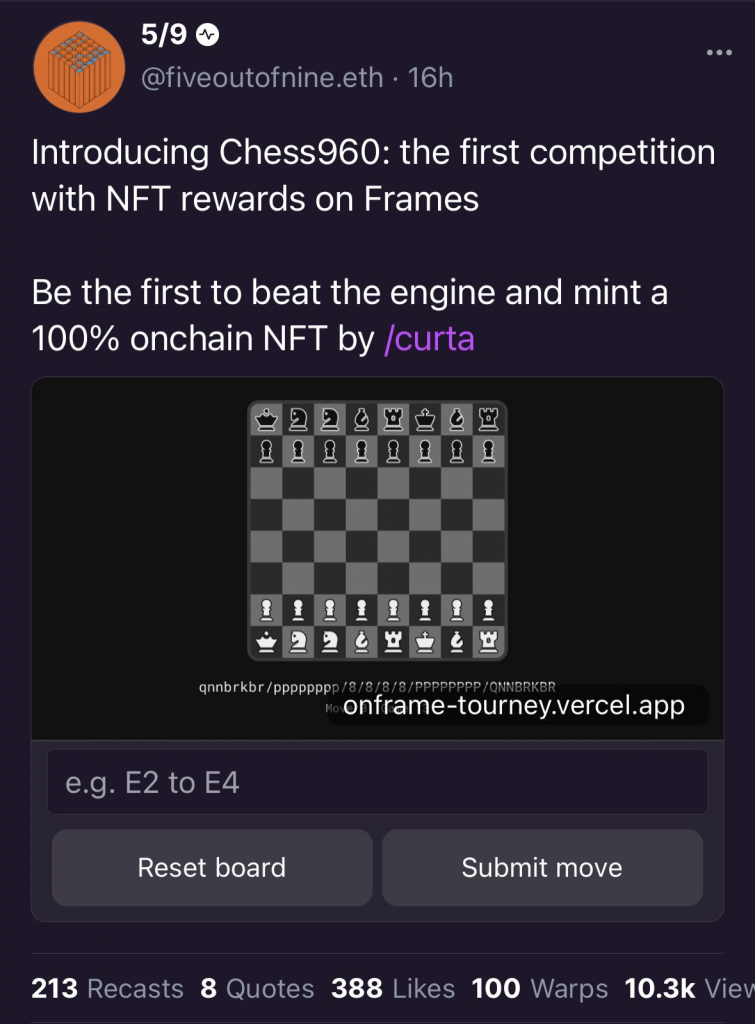
4 Potential Uses for Farcaster Frames
One-click booking systems
Whether you’re booking a hotel stay, a table for dinner or cinema tickets, your online booking likely won’t be complete without disclosing your name, email address and/or phone number. Given the Cambridge Analytica scandal of 2010, this is something that many modern internet users aren’t too fond of.
Frames could potentially allow Farcaster users to make bookings at the click of a button, without leaving the app and without giving up any personal information. Rather than being sent to a designated email address or phone number, purchases could be sent directly to the wallet tied to a user’s Farcaster account where reservations could be stored as NFTs.
Straight-to-market games
One industry that has been somewhat monopolised by a central entity is gaming, in particular mobile gaming which now almost exclusively takes place through the App Store and Google Play. Outside of China, Apple and Google control an astounding 95% of the app market. As a result, it’s become increasingly common for mobile games to introduce users to their offerings through social media ads before directing them towards app stores to download the game.
As mentioned earlier, Frames has already seen creators experiment by embedding very basic, mini-games into the app. But in the future could we see far more advanced, possibly even full-scale games, played within the Farcaster app?
Rather than simply showing users how their game looks, game developers could allow users to test it out for themselves without disrupting their current browsing session. The equivalent of scrolling through Twitter and being able to dive straight into a demo game as opposed to being served up an ad.
Artist-led music streaming
In web2, artists, sports stars and influencers have built up enormous followings across platforms like Instagram, Twitter and TikTok. But monetising those followings often involves a reliance on intermediary platforms like Spotify, platforms that profit from creators’ work. In fact, streaming makes up 84% of music industry revenue.
If Farcaster is anything to go by, web3 social networks will be side-by-side with eCommerce. Allowing anyone with a big following to cut out the middleman when it comes to selling their work.
Take the music industry for example. A world-famous artist could use Warpcast to announce the release of a new track to their millions of followers. But rather than direct them elsewhere to download the song, fans could quickly mint the new track to their wallet at the push of a button. Allowing the artist to retain a much larger cut, if not a whole 100%, of the profits.
Who knows, maybe we’re currently seeing Farcaster lay the groundwork for a decentralised version of Spotify to truly turn the music industry on its head.
Peer-to-peer betting
Another industry that could be turned on its head by the emergence of a peer-to-peer world is gambling. The global sports betting market is forecast to reach a value of USD 167.50 Billion by the year 2030. Obviously, the big beneficiaries of this are the bookmakers themselves. But what if anyone could play as the bookmaker using Farcaster Frames?
Here’s how it could work. User A opts to play as the house (the bookmaker). They offer other users odds of 10/1 (+1000) for the Chiefs to win the Superbowl again next year. This would give anyone who places the bet the opportunity to 10x their stake – considerably better odds than you’d receive elsewhere.
User A would need to lock up whatever amount they’re prepared to lose. Let’s say they send £5,000 worth of crypto to an external wallet. This would mean whenever the total stake of all users reaches £500, the market would be closed as there would not be enough funds to pay out any more winning bets.
To keep things simple, let’s say User B comes along and places a bet of £500 for the Chiefs to win the Superbowl in 2025. These funds would also be sent to the same wallet as User A’s £5,000.
After the event has taken place, oracles (responsible for verifying off-chain data on the blockchain) could verify the result onchain and trigger a smart contract to send the funds from the external wallet to either User A (if the bet loses) or User B (if the bet wins).
Final thoughts
Farcaster isn’t the first web3 social network, but it does feel different to the others. And it does appear to be the protocol best placed to drive a shift in how we connect, create, and interact online. Its decentralised nature empowers users, its innovative features like Frames unlock boundless possibilities, and its focus on community governance ensures a future shaped by its users.
Farcaster doesn’t just offer an alternative. It offers a future: a future where users control their data, creators reap the rewards of their work, and communities shape the platforms they use. With its ever-evolving features like Frames and a passionate developer community, Farcaster is poised to reshape the online landscape.
